Fitbit Inspire HR review: does a little bit of everything quite well
It's been around a while now, but the Fitbit Inspire HR is still a decent entry to the Fitbit family if you can find a good deal. Here's our review
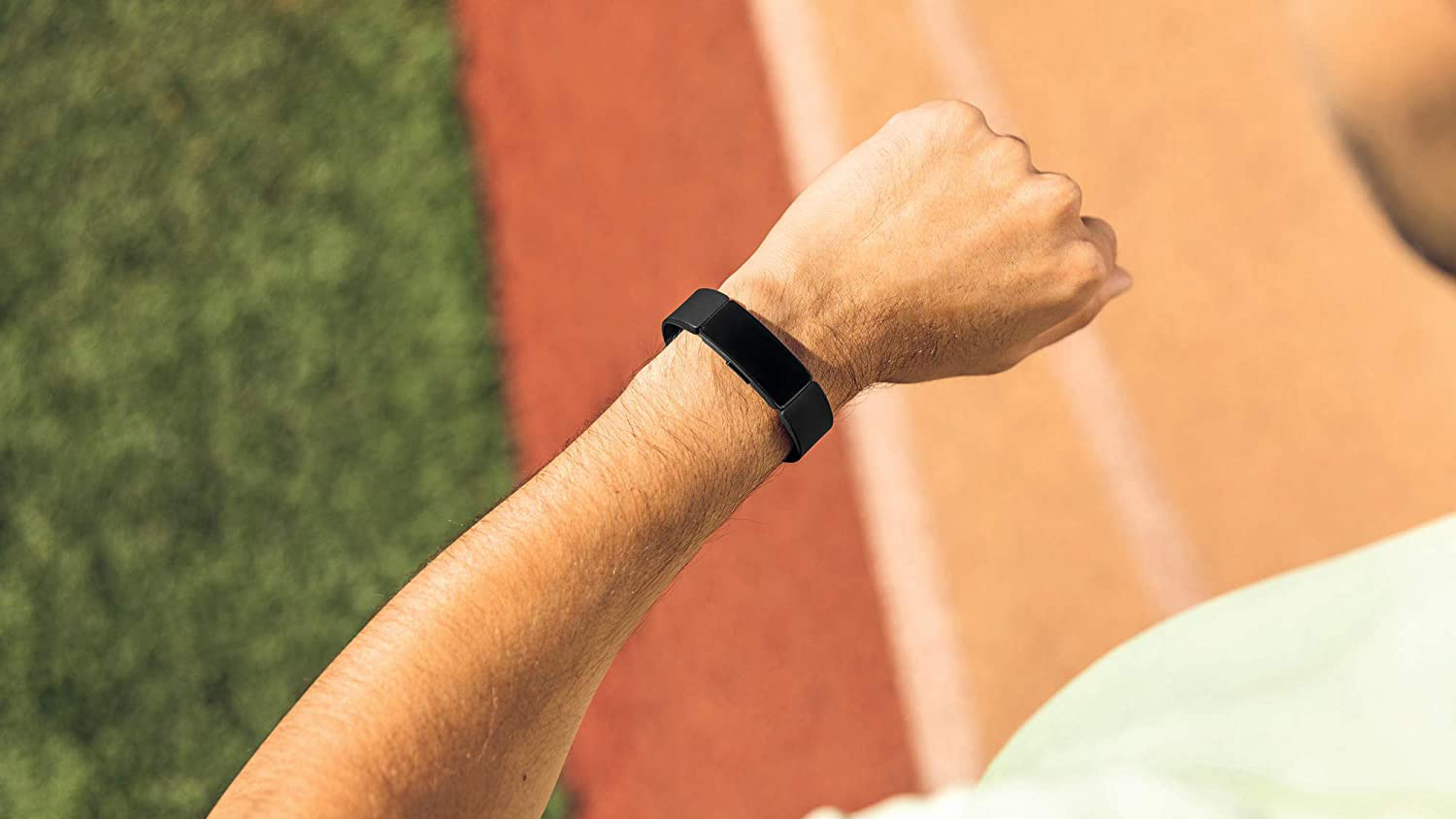
The Fitbit Inspire HR is a little long in the tooth now but if you can track one down, it still offers some useful if simple fitness tracking functionality. Its long battery life means you won't have to worry about maintaining it often either.
-
+
Can be quite cheap
-
+
Comfortable to wear
-
+
Good battery life
-
+
Simple to use
-
-
Strap can be awkward
-
-
Not the most stylish
-
-
No built-in GPS
Why you can trust T3

The Fitbit Inspire HR was once one of Fitbit's best sleep trackers and could be counted amongst the best fitness trackers in general. That time has passed, with the likes of the Fitbit Inspire 2 and Fitbit Charge 4 showing how things are done these days.
However, that doesn't make the Fitbit Inspire HR worthless by any means. If you can track down a cheap Fitbit deal, it still pairs up well with the Fitbit app, demonstrating how well-designed much of the Fitbit ecosystem is when it comes to longevity.
Features-wise, the Fitbit Inspire HR covers most of the bases besides standard activity tracking, and that includes a connected (if not built-in) GPS which should satisfy many users. A small 1.4-inch monochrome OLED screen isn't the best but its 128 x 72 resolution is sharp enough that it's clear at least, if not exactly pretty.
A 5-day battery life won't compare with the Fitbit Inspire 2 but that's good enough given the connected GPS functionality, and still means you won't have to remember to charge it too often. This is a fairly hands-off device which is convenient as we're not huge fans of a somewhat awkward strap.
So, the Fitbit Inspire HR isn't the best Fitbit around, and probably won't be most people's first choice for a fitness tracker. But if money is tight and you find a good bargain, it could well be worth snapping up as an introduction to your Fitbit experience.
- Fitbit Charge 5 is Fitbit’s latest and best tracker
Fitbit Inspire HR review: price and release date
The Fitbit Inspire HR was first released in 2019, with an RRP of USD$99.95 / GBP£89.99 / AU$179.95. Those times have changed and the best prices now come from third-party retailers or refurbished units. That's also for a version with a silicone band with other bands available including leather, double wrap, and stainless steel. Again, if you can find them.
The main features of the Fitbit Inspire HR include 24/7 heart rate monitoring, a swimproof design, 5 days of battery life, activity tracking, sleep tracking, and automatic exercise tracking for specific workout sessions.
Get all the latest news, reviews, deals and buying guides on gorgeous tech, home and active products from the T3 experts
Fitbit Inspire HR review: setup and use
Much like the rest of the Fitbit range, the Fitbit Inspire HR is very easy to set up. It takes minutes to unpack, place on your wrist and set up via the Fitbit app. Of course, it's even quicker if you have an existing Fitbit account but either option is pretty speedy.
We're not massive fans of the wrist strap admittedly. The standard one that comes with the Fitbit Inspire HR is a fairly cheap but surprisingly sturdy plastic strap. The downside to this sturdiness is that it can be awkward to wrap around your wrist, especially if your wrists are slender. Alongside that issue is the fact there's only one buckle to hold the remaining/loose strap to your wrist. Rather than a regular watch strap design like the one seen on the Fitbit Inspire 2, for instance, you clip the band in with a press and it's not quite as secure as we'd have liked.
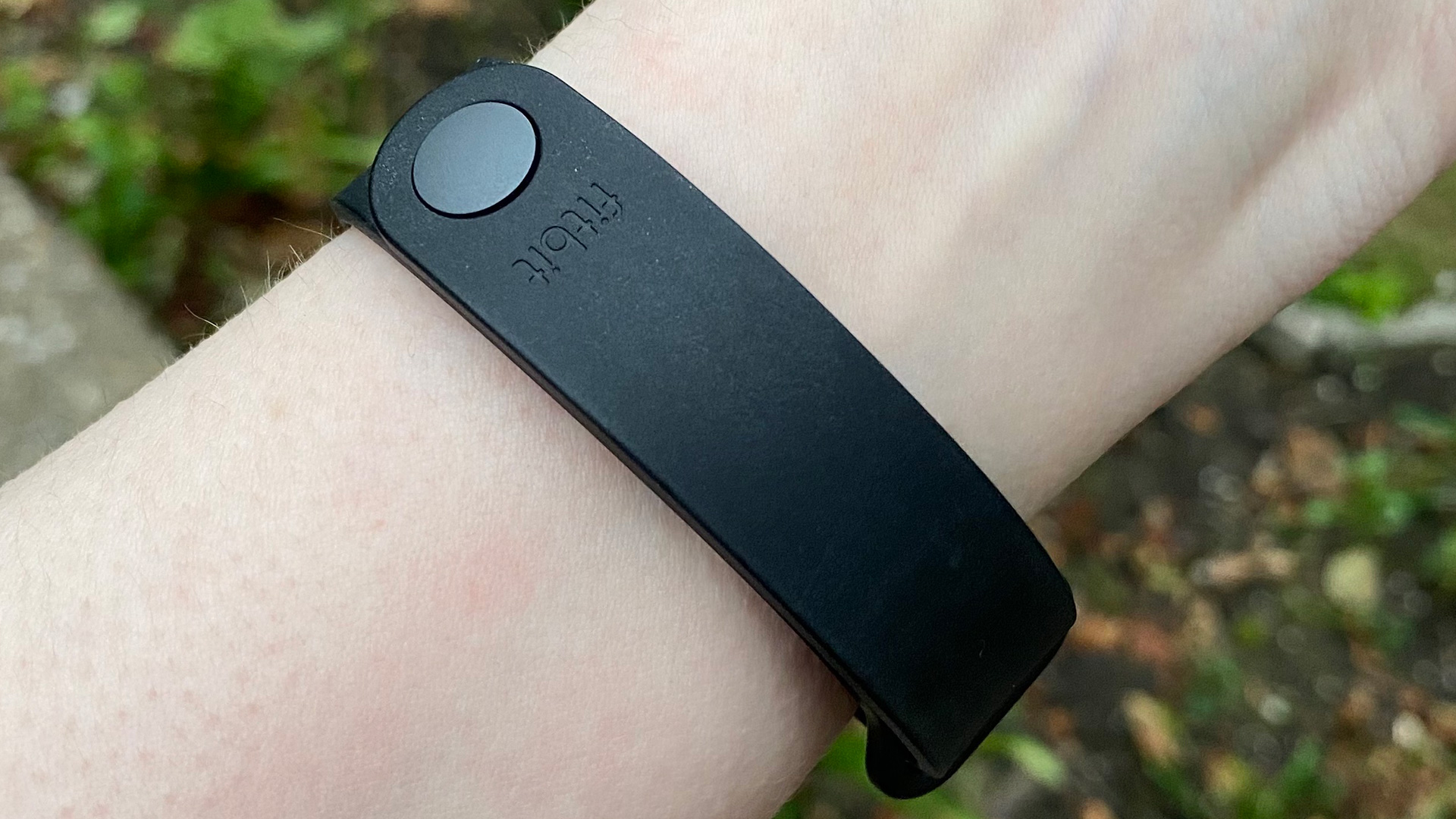
Outside of those physical issues though, and once the Fitbit Inspire HR is on you, it's simple stuff. The Fitbit app is intuitive and merely requires you to enter a few key details like your age, weight, and fitness aims, before figuring out what's best for you. While the battery life isn't the longest of fitness trackers, 5 days is enough that means you won't have to fight with the wrist strap too often either.
Fitbit Inspire HR review: design and build quality
The Fitbit Inspire HR was one of the sleekest looking fitness trackers when it first launched, despite being a little thick. It's not quite as shiny or classy looking now when you compare it to the competition but it still doesn't steal focus by any means.
Standard color choices are black, lilac or white with black likely to fit most into someone's aesthetic. The build quality is sturdy too, giving you a sense that it's not going to be easily damaged while you work out or partake in a swim.
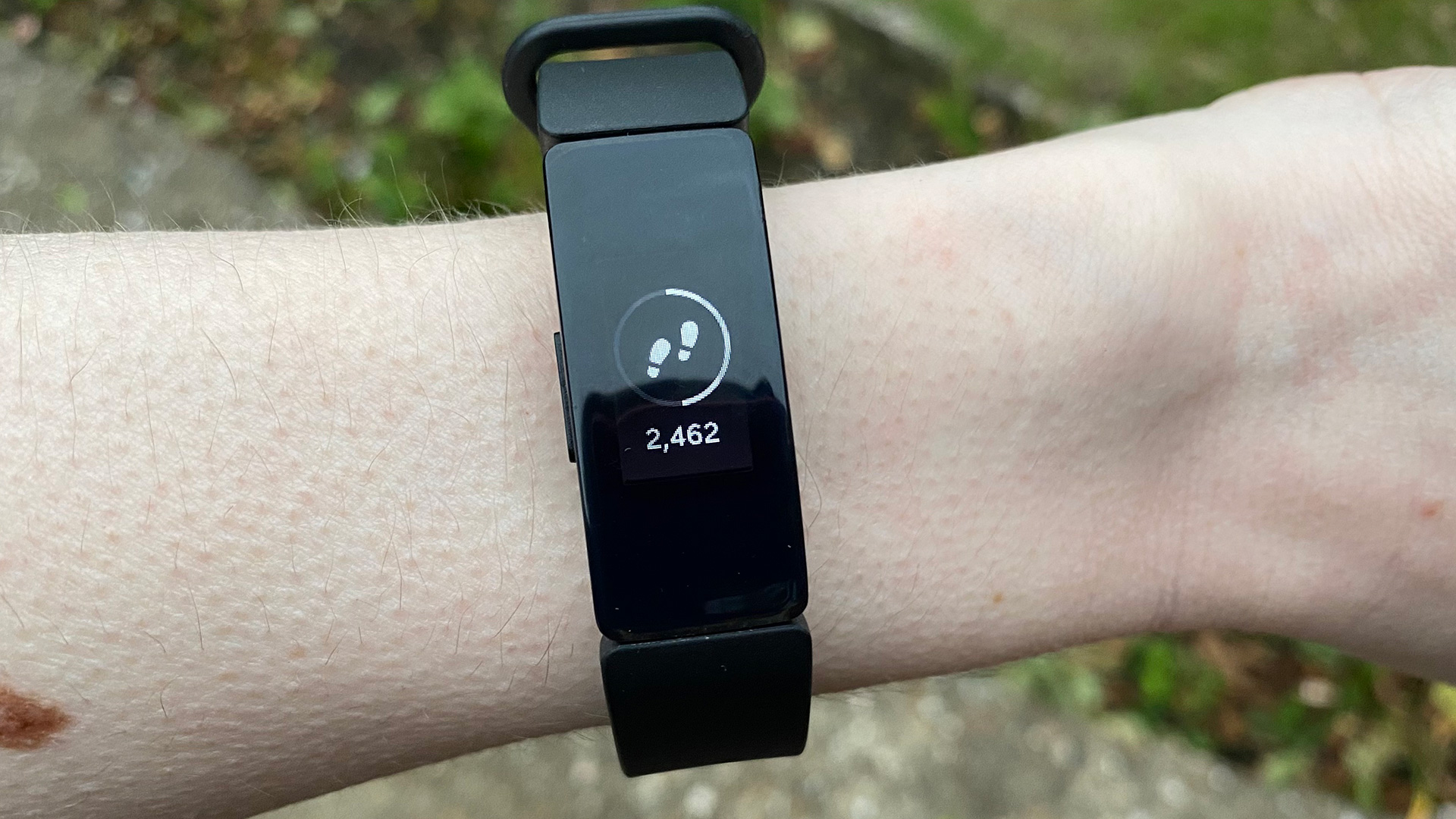
The right hand side of the device has a button for waking the screen up or taking you back to the home screen with swipes on the touchscreen helping you negotiate the commands. It's not as responsive or as fancy looking as a smartwatch but it gets the job done. For the most part, you'll be using the app to check stats anyhow but it's convenient to be able to view your performance via the small but sharp 1.4-inch OLED screen. It's also possible to start a few exercises here or use the guided breathing sessions although it's not the simplest of interfaces.
Style wise, we're not fans of the thick bezels that surround the display, wishing that space could have been used for something better but again, it's a slight sign of the age of the device given newer Fitbits are sleeker.
One big pro for swimmers is that the Fitbit Inspire HR is swim proof so you can use it to track duration and calorie burn. We didn't get to test this ourselves but it's worth noting it's generally considered to be fairly basic compared to other swim trackers.
Fitbit Inspire HR review: features
The Fitbit Inspire HR has a key feature that the Fitbit Inspire 2 lacks – a connected GPS. While it's not as good as a 'proper' GPS because you'll still need to keep it close to your phone to track where you've been, it's a step up and rather useful if you take your phone out a lot anyhow.
There's also 24/7 heart rate tracking unlike with the standard Fitbit Inspire which is always a big advantage when tracking how you're doing throughout the day. SmartTrack is in there too which automatically recognises your workouts and records them for you. Like with other Fitbit devices, it's pretty accurate too. Use the running workout, for instance, and it'll show distance, pace, average pace, heart rate, calories burned, and so forth. Heart rate will never be as accurate as with a dedicated heart rate monitor but it's a strong backup for your wrist.
As with other fitness trackers, the strength here really is in the day to day stuff. The Inspire HR tracks your daily steps, resting heart rate and calories burned. It's a useful indication of how well you're doing that day when it's likely a more dedicated fitness enthusiast may prefer a smartwatch for 'proper' routines.
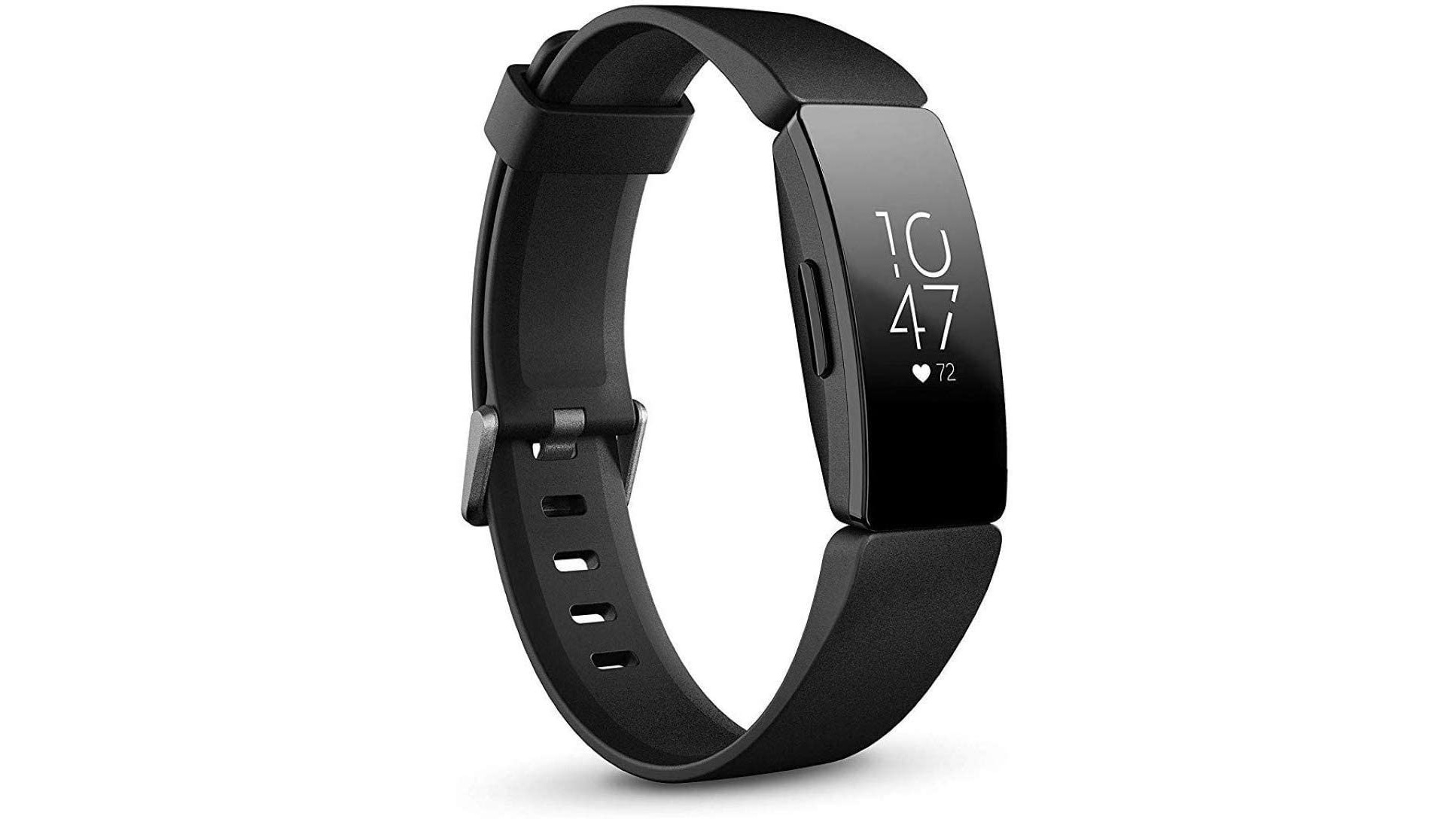
Similarly, we doubt you'll be using the guided breathing exercises often, instead favoring dedicated apps but it taps into the idea that the Fitbit Inspire HR does a little bit of everything able nothing impressively well.
Outside of the fitness/general wellbeing side of things, the Fitbit Inspire HR also offers the option to track notifications from your phone. The tiny screen means you'll rarely see the full text or WhatsApp message but it's a useful starting point so you'll know if it's worth digging your phone out or not.
Like with other Fitbit devices of this age, don't expect music playback or Fitbit Pay support here.
Fitbit Inspire HR review: sleep tracking
The Fitbit range is generally pretty good at sleep tracking and that's the case here with the Fitbit Inspire HR being a good, cheap way of tracking how you sleep. That's aided by the fact it's comfy to wear so you won't notice it while you sleep unlike with smartwatches or anything bulkier.
It's not as in-depth as a dedicated sleep tracker but you'll get the amount of time you've slept, how often you woke up, and how many times you were restless in the night. There's also the useful Sleep Stages breakdown which gives you an idea of any underlying issues or simply if there's a particular time where it feels like your neighbours keep making a lot of noise. It works via a mixture of the accelerometer and the heart rate monitor so it feels reasonably effective.
Advice is also offered on how to improve your sleep quality but a lot of this is common sense and something you probably already (grudgingly) know.
Fitbit Inspire HR review: comfort and fit
Once you get the Fitbit Inspire HR on your wrist, it's very comfortable. You won't notice it's there thanks to it being so lightweight. The plastic strap isn't the easiest to attach to your wrist thanks to being quite inflexible but it's secure to your arm at least once there.
That's perfect as you'll want to wear this all day and night to monitor your sleep as well as your daily activities. Being waterproof means you won't have to worry about it in a rain shower or your actual shower either, with swimming and bathing an option too. The 5-day battery life isn't as strong as something like the Fitbit Inspire 2 but it's accurate. We found it lasted that long with the magnetic charging cable doing the hard work to recharge. It's a proprietary cable which is never ideal but it works well enough and only takes a couple of hours to get you from 0% to 100%.
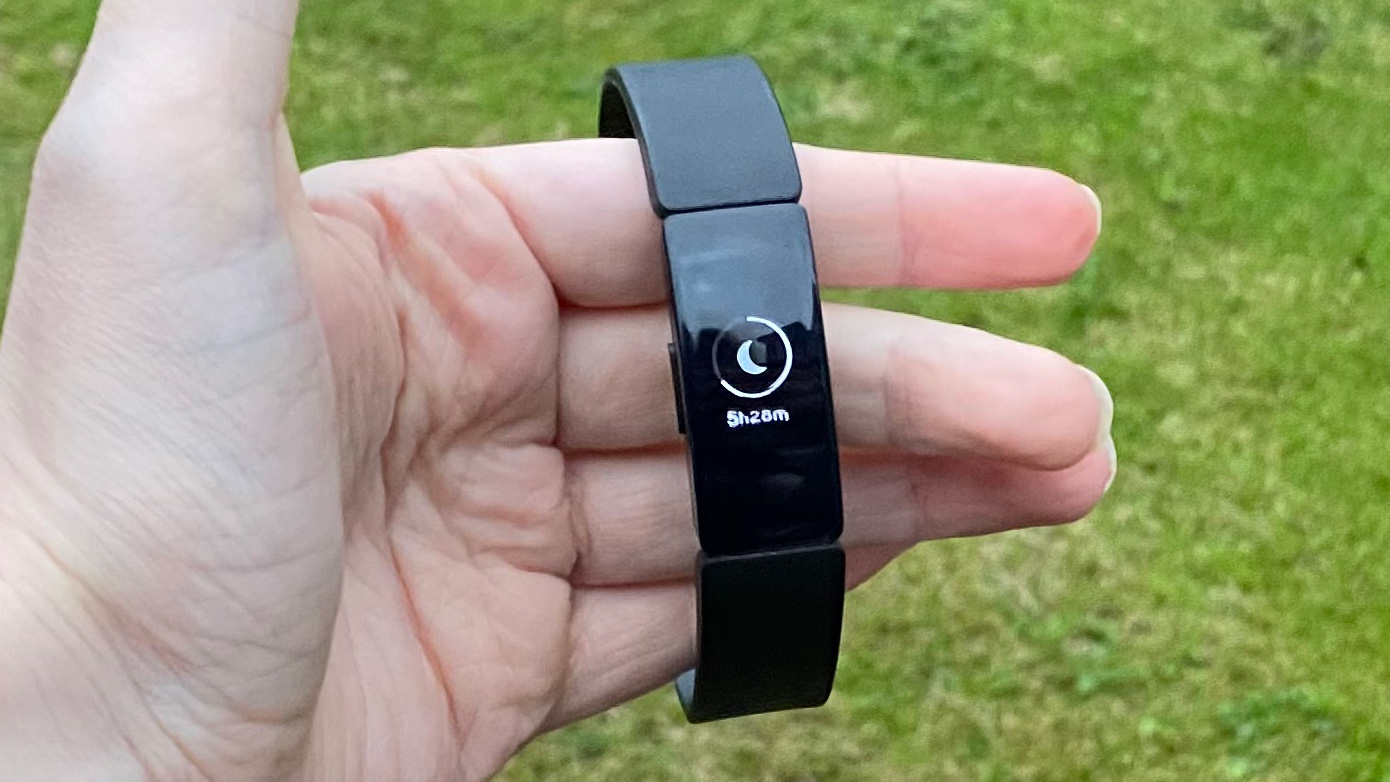
Fitbit Inspire HR review: verdict
The Fitbit Inspire HR remains a reasonably good fitness tracker but it's showing its age. It's possible to buy cheaper and more stylish devices that offer similar or better features, such as the Fitbit Charge 4 or even the Fitbit Luxe.
Still, find it at a good price and the Fitbit Inspire HR will serve you well. You'll still need your phone by your side for GPS tracking but at least it's possible (not the case with devices such as the Fitbit Inspire 2). It might lack more advanced exercise tracking such as Active Zone Minutes (a killer feature amongst newer Fitbits) but the Fitbit Inspire HR does a little bit of everything quite well.
It's robust enough to survive a few knocks and its swim proofing will be helpful for some users even if its swim tracking is a touch limited for avid water enthusiasts.
Time has moved on a little for the Fitbit Inspire HR but don't write it off just yet. Look out for it at a good price and it can still prove a good entry to the Fitbit family until you move onto knowing more about what you're specifically looking for.
Fitbit Inspire HR review: also consider
The best fitness trackers field is extensive and time has moved away from the Fitbit Inspire HR. Still decent enough, it's a good sleep tracker but less so a good fitness tracker.
The Fitbit Charge 4 is more expensive but offers the same sleep tracking tools as well as GPS and Active Zone Minutes. The latter feature is particularly useful if you're keen about pushing yourself a little more while working out but want to know just what you're doing to your body.
Alternatively, you could go cheaper and buy something like the Xiaomi Mi Band 4. It's a bargain and offers a lot of the features that the Fitbit Inspire HR including heart rate tracking but there's no GPS. On the plus side, its battery life is an impressive 20 days and it also offers sleep monitoring.
Go the other way and there's always the massive treat – the Apple Watch Series 6. Overkill for those looking to track their sleep, it's still gorgeous with an always-on display that looks as expensive as it is, extensive app support so you can find plenty of health and fitness options that suit you, and some very powerful health sensors. This is complete overkill if you're on a budget but if you're looking to invest in a long term solution, you won't be disappointed.

Jennifer Allen has been writing about tech for nearly a decade. Her specialisms include fitness wearables, Bluetooth speakers, and all things Apple.